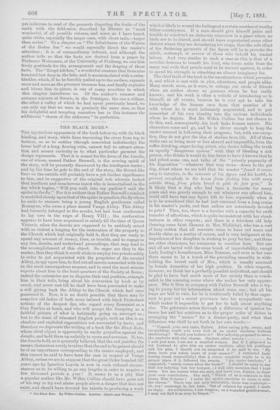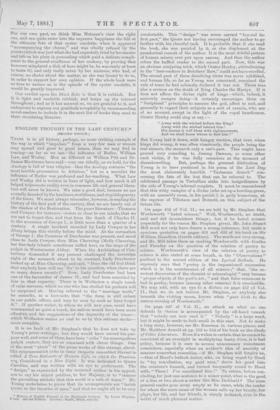THE BLACK ROBE.* Tun mysterious appearance of the book before
us, with its black binding, and wavy, white lines traversing the cover from top to bottom, so as to outline (though somewhat indistinctly) the lower half of a long, flowing robe, cannot fail to attract atten- tion and arouse curiosity as to what particular garment the design. represents. That it is meant for the dress of the Jesuits, one of whom, named Father Benwell, is the moving spirit of the story, will be presently discovered by the intelligent reader ; and by the time he gets to the end of the story, the thread-like lines on the outside will probably have a yet further significance to him, and be suggestive of the original web wherein lurked that insidious and treacherous insect who is immortalised in the
lay which begins, "Will you walk into my parlour P said the spider to the fly." For it is evident that Father Benwell's conduct is modelled closely upon that of the spider in question,the fly whom lie seeks to ensnare being a young English gentleman called Romayne, who owns a place named Vange Abbey. This Abbey had formerly belonged to the monks, but had been confiscated to lay uses in the reign of Henry VIII.; the confiscation appears to have been acquiesced in calmly till the time of Queen Victoria, when the Jesuits are supposed to be suddenly seized with so violent a longing for the restoration of the property to the Church which had originally held it, that they are ready to spend any amount of money, time, or trouble, and to engage in any lies, deceits, and underhand proceedings, that may tend to the accomplishment of this object. So eager are they in the matter, that they think it worth while to employ two priests solely in order to get acquainted with the proprietor of the coveted Abbey, to spy upon him, to find out all secrets connected with him in the most unscrupulous manner, and to send the most minute reports about him to the head-quarters of the Society at Rome ; indeed the emissaries are to disguise their real position, entangle him in their toils, bring about his conversion by hook or by crook, and never rest till he shall have been persuaded to make a will giving back the Abbey to the Church which had once possessed it. Now, it is no doubt possible that there may be some few old ladies of both sexes imbued with black Protestant notions of the deepest dye, who regard every Romanist as a Guy Fawkes at heart, and who will accept the foregoing as a faithful picture of what is habitually going on amongst us; but to the mass of educated English people, such an idea is an obsolete and exploded superstition not warranted by facts; and therefore we deprecate the writing of a book like the Black Robe, whose chief object is apparently to excite prejudice against the Jesuits, and hold them up unfairly to scorn and aversion. If, too, the Jesuits hold, as is generally believed, that the end justifies the means, that axiom surely involves that the end to be gained should be of an importance corresponding to the means employed; and this cannot be said to have been the case in respect of Vange Abbey, unless we are to suppose that the great Order founded 317 years ago by Ignatius Loyola is now in such reduced circum- stances as to be willing to go any lengths iu order to acquire a few thousand pounds a year 1 It seems to us a pity that a popular author like Mr. Wilkie Collins should have gone out of his way to try and alarm people about a danger that does not exist, end should have devoted his talents to producing a work
• 1 he Black Robe. By Wilkie Collins. London : Matto and Windus.
which is likely to wound the feelings of a certain number of worthy fellow-countrymen. If a man should give himself pains and trouble to construct an elaborate scarecrow iu a place where no birds are to be feared, and should leave unprotected some other district where they are devastating his crops, then the sole effect of the fluttering garments of the figure will be to provoke the mirth, contempt, or sorrow of those who behold his wasted
labour. And very similar to such a ease as this is that of a novelist desirous to benefit his kind, who turns aside from the
many real evils that people need. to be warned against, in order to spend his strength in attacking an almost imaginary foe.
The chief fault of the book is the unnaturalness which pervades it, and which is met with in plot, situations, and people alike.
Many novels seem, as it were, to enlarge our circle of friends when an author shows us persous whom he has really known ; and his work is often a vehicle of introducing us to himself, at all events, because he is very apt to take his knowledge of the human race from that member of it with whom he is most intimately acquainted, and to put somewhat of his own identity into the various individuals whom he depicts. But Mr. Wilkie Collins has not chosen to do this, and, consequently, his book lacks human nature. His characters come and go, and he is clever enough to keep the reader amused in following their progress ; but, with one excep- tion, they do not give the idea of studies from life. All of them strike one as being more or less absurd aud impossible, from the coffee drinking, sugar-loving priest, who deems telling the truth an equally "dangerous system" with that of bleeding a sick person, who thinks it would do him harm to have it known that he
had pitied some one, and talks of the " priestly pugnacity of his disposition "—whatever that may mean—down to the pet dog, about whom we are told that his master "found it neces- sary to intemfere, in the interests (if his figure and his health, to prevent everybody in the house front feeding him with, every eatable' thing, from plain bread to pdte do foie gm-as." Is
it likely that a dog who had been a favourite for many years and was greedy enough to eat whatever was offered him, could still have had any figure left to lose, especially when it is to be considered that he had just returned from a long cruise in his master's yacht, and that sailors are notoriously devoted to pets P Then, too, there is a heroine with a capacity for swift transfer of affections, which is quite inconsistent with her stead- fastness in other respects ; and there is a frivolous old lady (bearing some faint likeness to Mrs. Nickleby), who has a sort of hazy notion that all converts come to have red noses and double chins as a matter of course, and is very indignant at the impudence of her daughter in wishing to pray for her ; and there are other characters, too numerous to mention here. But one and all are tarred with the same brush of improbability, except Lady Loring's housekeeper, Miss Notman, and even iu her case there seems to be a touch of the prevailing unreality iu with- holding the brevet rank of Mrs., which is usually assumed by female domestics of her high position. In other respects, however, we think her a perfectly possible individual, and should be glad to have had much more of her society than is vouch- safed in the amusing scene where she makes her only appear- ance. She is then in company with Father Benwell who is try- ing to pump her for information about seine one ; but all his traps are laid in vain, for lie is continually foiled by that eager- ness to pour out a recent grievance into his sympathetic ear, which makes it impossible to get her to talk about anything else. The grievance arises through a difference of opinion be- tween her and her mistress as to the proper order of dishes iu arranging the " menoo" for a dinner-party, and what that difference was shall be set forth in her own words :-
"' Consult your own taste, Father. After eating jelly, cream, and ice-pudding, could you even look at an oyster omelette without shuddering ? Would you believe it ? Her ladyship proposed to servo the omelette with the cheese. Oysters, after sweets As I said just now, I am not a married woman. But if I proposed to my husband to give him en oyster omelette after his puddings and his pies, I should not be surprised if ho said to me, " My dear, have you taken leave of your senses?" I reminded Lady Loring (most respectfully) that a cheese omelette might be in its proper place if it followed the sweets. " An oyster omelette," suggested, "surely comes after the birds ?" I should be sorry to say that her ladyship lost her temper,—I will only mention that 1 kept mine. Let me repeat what she said, and leave you, Father, to draw your own conclusions. She said, " Which of us is mistress in this house, Miss Notman ? I order the oyster omelette to come in with the cheese." There was not only irritability-, there was contempt— oh, yes ! contempt in her tone. Out of respect for myself, I made no reply. As a Christian, I can forgive ; as a wounded gentlewoman, I may not find it so easy to forget.' "
For our own part, we think Miss Notman's view the right one, and can quite enter into the supreme happiness she felt at the ultimate fate of that oyster omelette, when it appeared "accompanying the cheese," and was wholly refused by the guests (which was just what she had expected), tried by her master and left on his plate (a proceeding which paid a delicate compli- ment to the general excellence of her cookery, by proving that however misplaced a dish of hers might be, he was ready at least to taste it), and only really eaten by her mistress, who had, of course, no choice about the matter, as she was bound to do so, in order to support her own opinion. If the whole book wore as true to nature as is the episode of the oyster omelette, it would be greatly improved.
Our verdict upon the Black Robe is that it is rubbish. But it is light and readable rubbish, and keeps up the interest throughout ; and as it has amused us, we are grateful to it, and endeavour to express our gratitude acceptably by recommending novel-readers to include it in the next list of books they send to their circulating libraries.



































 Previous page
Previous page